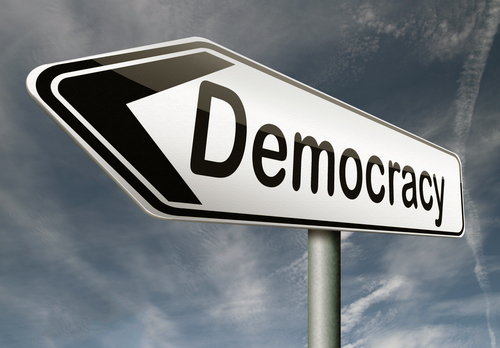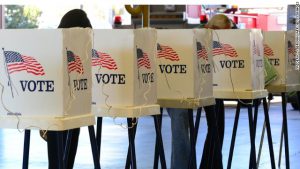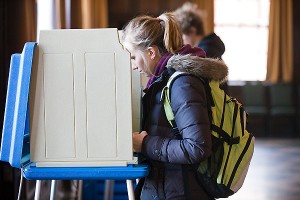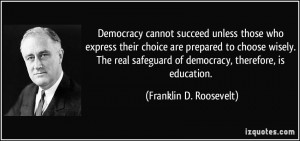It’s presidential election season in America. If there is a time when more Americans pay attention to politics, it is now. Now is thus perhaps the best time to challenge how Americans think about democracy. More often than not, the word “democracy” conjures electing representatives to govern. As important as that is, there is more to democracy, and that “more” is well worth pondering.
The influential 20th century American philosopher, John Dewey was one of democracy’s most ardent proponents. But his view of democracy was broad and participatory, not limited to electing politicians to govern (Dewey 1927, Morris & Shapiro 1993). As historian James Kloppenberg explains, summarizing the work of one of Dewey’s intellectual chroniclers, “First, Dewey believed that democracy is an ethical ideal rather than merely a political arrangement. Second, he considered participation, not representation, the essence of democracy. Third, he insisted on the harmony between democracy and the scientific method: ever-expanding and self-critical communities of inquiry, operating on pragmatic principles and constantly revising their beliefs in light of new evidence, provided Dewey with a model for democratic decision making…Finally, Dewey called for extending democracy, conceived as an ethical project, from politics to industry and society” (Kloppenburg 1992).
 To Dewey then, democracy is an ongoing way of being that involves participation in learning and decision-making in most if not all domains of life, including family, work, associations and government. Dewey is, of course, not alone in advocating a more “participatory” version of democracy (e.g., see Pateman 1970, Mansbridge 1983, Barber 2004, Fishkin 2011), but this version is not what prevails in the United States and other modern democracies.
To Dewey then, democracy is an ongoing way of being that involves participation in learning and decision-making in most if not all domains of life, including family, work, associations and government. Dewey is, of course, not alone in advocating a more “participatory” version of democracy (e.g., see Pateman 1970, Mansbridge 1983, Barber 2004, Fishkin 2011), but this version is not what prevails in the United States and other modern democracies.
What prevails political observers commonly call representative democracy, or a republic. In contemporary republics, democracy is like a gladiator’s contest, as the political scientist Lester Milbrath (1965) aptly described: at any given time, about 5-7% of citizens are the gladiators who run for office and lead political campaigns and organizations. The spectators, who comprise 55-65% of the public, pay attention, express support and vote. The rest, whom Milbrath called “the apathetics,” comprising 30-40% of citizens, don’t bother to come to the show — they don’t pay attention, let alone act politically, and thus know little about politics. This republican democracy is associated with greater inequalities in participation and power as well as greater apathy and partisanship.
Some political scientists claim that republican democracy is inevitable, that one cannot realistically expect citizens to be engaged in the same way all the time, and that more engagement may only lead to more conflict and crisis from competing citizen demands. These claims though generally assume that democracy should be limited to government, and that active citizens are partisans rather than deliberators.
Dewey, like other participatory democrats, contends that all organizations – governmental, business and nonprofit – engage in decision-making, and that decision-making can be made more democratic, involving more people rather than habitually delegating to executives or representatives. Further, whether citizens become rigid, self-interested partisans or flexible, public-interested deliberators depends in no small part on the rules of engagement organizations establish, including the ideal citizens organizations uphold.
Clearly, as numerous notable political observers (e.g., more recently, Haidt 2012, Fukuyama 2014) remark, drawing on evolutionary science, humans are inclined to be self-interested, but we are also routinely cooperative when it suits us, and for better or worse, even self-abnegating when moved by another individual or group to whom we feel committed. As social scientists know well, how we act depends a lot on our social circumstances, and the organizations in which we live and work every day play a large role in defining those circumstances.
The implications are that (a) more participatory democracy is possible, and (b) democratic organizations can make it happen. Indeed, there are plenty of contemporary examples, including organizations like Voice of the People, Healthy Democracy and the Center for Deliberative Democracy. Groups like these get diverse citizens involved in local to international dialogues that nurture more equitable, tolerant, informed and public-spirited decision-making among citizens and policymakers alike. Yet to make democracy a routine practice, as Dewey envisioned, rather than a periodic choice, calls for imagining, discussing and enacting models that democratize not only government, but also society.
To this end, we at Learning Life are looking into developing regular democracy dialogues in our nation’s capital. These dialogues would follow on Learning Life’s mission to spread knowledge, and on our ongoing interest in developing local learning infrastructure. These “DMV democracy dialogues” would, every 1-2 months, assemble advocates, researchers, students and citizens to learn about what democracy organizations in the Washington D.C. metro area are doing, and to facilitate their communication and collaboration on a range of issues in civil and civic engagement, voter rights, ballot integrity, campaign finance, participatory budgeting, workplace democracy, and more.
If you live in metro Washington D.C., and are interested in being updated or learning more about these democracy dialogues, please email me at paul@letlearninglive.org.
Paul Lachelier, Ph.D.
Founder, Learning Life
References:
Barber, Benjamin. 2004. Strong Democracy: Participatory Politics for a New Age. Berkeley: University of California Press.
Dewey, John. 1927. The Public and its Problems. New York: Holt.
Fishkin, James. 2011. When the People Speak. Oxford: Oxford University Press.
Fukuyama, Francis. 2014. Political Order and Political Decay: From the Industrial Revolution to the Globalization of Democracy. New York: Farrar, Straus & Giroux.
Haidt, Jonathan. 2012. The Righteous Mind: Why Good People Are Divided by Politics and Religion. New York: Pantheon Books.
Kloppenberg, James T. 1992. Book review of John Dewey and American Democracy, by Robert B. Westbrook in American Historical Review, p.919-920.
Mansbridge, Jane. 1983. Beyond Adversary Democracy. Chicago: University of Chicago Press.
Milbrath, Lester. 1965. Political Participation: How and Why Do People Get Involved in Politics?Chicago: Rand McNally & Co.
Morris, Debra, and Ian Shapiro, eds. 1993. John Dewey: The Political Writings. Indianapolis: Hackett.
Pateman, Carole. 1970. Participation and Democratic Theory. London: Cambridge University Press.




